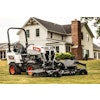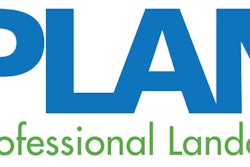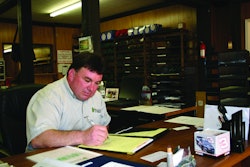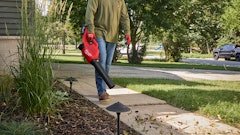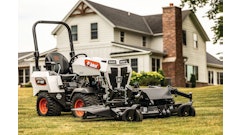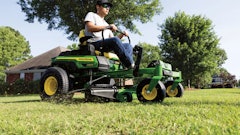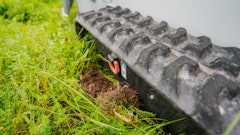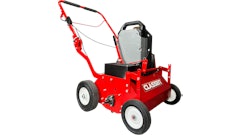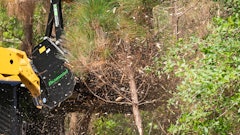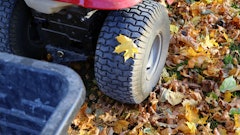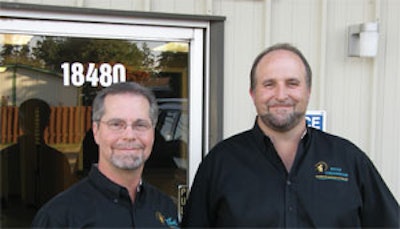
Talk about being safe. Willamette Landscape Services (WLS) in Tualatin, OR, is one of the few landscape companies in the United States to have achieved SHARP designation. SHARP, which stands for Safety & Health Achievement Recognition Program, is an OSHA initiative that recognizes this country’s most successful and safe workplaces. Indeed, WLS has experienced only one time-loss injury over the last 4,000 days. The company is also a member of PLANET’s STARS program.
“Safety and providing excellent service go hand-in-hand,” says WLS vice president Matt Triplett, CLP, CLT. “The key to both is training, and we pride ourselves in fielding crew members who understand how to operate equipment in a safe manner—and in ways that will deliver a top product to our customers.”
A full-service landscape management company, WLS was formed in 1997 after owners Triplett and his partner, company president Randy McManus, CLP, purchased the business from Drake’s 7 Dees. Both Triplett and McManus were Drake’s employees at the time, and having worked previously for another landscape management company, the two hit the ground running. They had a plan, and only needed to execute it.
BUILDING HOA LOYALTY
McManus says, “Our plan was to focus on a tight niche, and deliver a product or service that, as our mission statement relays, ‘creates a lasting impression.’ We haven’t wavered from that plan. Our focus continues to be HOAs. Over time, with the best long-term interests of our customers at the heart of our methods and recommendations, we become our customer’s trusted advisors.
“Placing high-value work and an equally high level of service ahead of price may sound unrealistic in today’s economy, but, as a company, we are very patient,” McManus continues. “We’ve never aspired to be the largest company around. Instead, we’ve wanted to generate slow, steady growth with a very loyal client base. The folks who live in HOAs have a vested interest in their properties, which means they have a vested interest in a company that will deliver a high value service that will return dividends over the long term.”
Driven to provide the best services for his customers, McManus briefly describes how their company approaches a potential HOA client. “We tell them up front that the value of services is of far greater importance to the community than the lowest bid price. Just as an example, we explain how pruning methods can have a dramatic impact on a community. It not only affects home values, but also curb appeal and plant replacement costs, as well as residents’ sense of pride and well-being.
“We explain that our Plant Health Care crews go well beyond simple trimming for form and containment,” McManus continues. “They routinely work to improve the branch structure of trees and shrubs; to keep them in balance with the landscape.”
McManus goes on to detail other valuable services, including spring and summer inspection of irrigation systems by certified specialists, and the company’s dedication to maintaining healthy turf while minimizing herbicide use.
WLS operates three divisions: maintenance; water conservation, irrigation and drainage; and enhancements and in-house design. The divisions are supported by nine mow crews, eight plant health care crews, five irrigation crews, two spray crews and two enhancement crews. Maintenance services account for 70% of the company’s sales while irrigation and enhancement account for 15% each.
FEWER INJURIES, LOWER COSTS
When asked why WLS decided to dial up its safety program five years ago, Triplett says, “We wanted to further minimize our time-loss injuries and reduce our insurance costs. We were doing basically the right things safety-wise, but we intuitively knew that, as a company, we could be even safer. Even more importantly, it’s about being able to look employees in their eyes and say that our company has made every possible effort to create a safe work environment for them.”
Triplett goes on to explain that becoming SHARP Certified was a top-to-bottom endeavor. “To achieve SHARP designation, an employer must pass OSHA’s 58-point comprehensive assessment of safety practices. That means scoring at least a two out of three on 58 safety line items, and then going back and improving to a three on those you only scored two on.
“OSHA representatives, through their consultative services program, visited with our employees and quizzed them, looked at every job we did, performed a site safety evaluation on every one of our 150 properties, and worked closely with company safety chairmen Dan Herzing (CLP, CLT, CLIA) and Jesse Stegman (OLP, CLT, CLIA),” Triplett goes on to say. “Again, we were operating in a safe way, but there could always be improvement. Just as an example, through participating in SHARP, we learned that some power equipment applications required double hearing protection. Five years later, hearing levels for operators of this equipment have actually improved.”
Putting safety first and becoming SHARP Certified has created a culture focused on safe practices. WLS employees attend a weekly safety meeting. The safety committee, which includes participation by local insurance professionals, convenes once a month. The company created an extensive database of potential hazards and near-miss incidents that can be sourced by category. There’s also annual driving training for all drivers.
CUTTING COSTS WHILE MAINTAINING QUALITY
With 12% unemployment, Oregon’s poor economy has definitely impacted business—but it hasn’t changed the way WLS does business. “Sometimes I get frustrated with Randy (McManus) because for him there’s only one way to provide our service offering, and that’s the right way,” says Triplett. “Not that I want to cut corners, but sometimes you have to compromise with customers to get the work. Randy, on the other hand, would rather lose the work than compromise on important services.”
Because McManus has a holistic view of landscaping and landscape maintenance—that every element has an important part to play and must be maintained to accepted horticultural standards—Triplett has to be creative in other ways in order to remain competitive and profitable. As the company’s business manager, he accomplishes that by controlling costs.
“We tend to use Excel for gathering information and comparing what’s budgeted for a particular account vs. actual costs,” Triplett explains. “We’re detail-oriented, tracking our work to within one-tenth of an hour.”
To help analyze data, WLS developed its own personalized database, Willamette Information Management Systems (WIMS). “It’s not just a tool for me, because all of our managers have access to it and use it to track their accounts,” Triplett emphasizes.
WLS also utilizes a GPS system to help manage costs by monitoring crew driving habits, stop locations, idle time and speed. All managers also save on fuel costs by driving hybrid vehicles, which also supports the company’s commitment to the environment.
“We recycle 8 million tons of yard debris annually,” Triplett relates. “We’re Eco-Biz certified, meaning that, among other environmental practices, we minimize resource use and minimize or reuse wastes. For example, all facility power comes from 100% renewable resources like wind and bio-mass recycling. WLS offers customers a no-pesticides and organic-based fertilizer program, along with access to our Water Conservation services. And all of our managers drive Toyota Prius hybrids.”
TIMELY TIPS
How can any landscape contractor take safety and service to higher levels? Triplett admits that getting SHARP Certified isn’t for everyone. It requires a huge effort and the expenditure of vast amounts of time. There are alternatives, he points out, including joining PLANET’s STARS Safe Company program, which is free to all landscape contractors nationwide. Having a safety committee and conducting regular safety meetings, a requisite for being a STARS member, is also a good place to start.
The partners emphasize how critical it is to become involved—with your community, local colleges and associations, including those that involve customers. Training and continuing education are other keys. WLS has 10 Certified Landscape Technicians and three Certified Landscape Professionals on its team, along with four Certified Landscape Irrigation Auditors and 12 licensed pesticide applicators and trainees.
The bottom line is not all about money, McManus and Triplett agree. Yes, companies have to be profitable to stay in business, but putting profits before service can be highly destructive. “Have some enjoyment, too,” says Triplett. “We’re a fun-loving bunch. You can walk in our office just about any time and hear music playing and sense the levity of the moment.”




